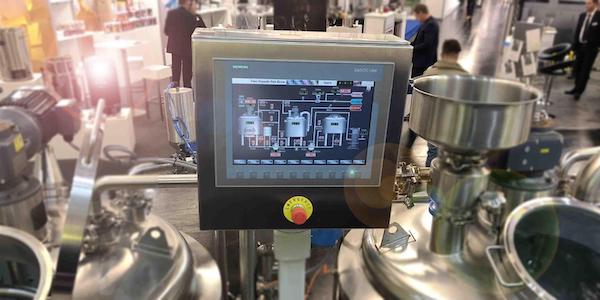Learn about the fundamentals of industrial PCs (IPCs), including their common types and architecture, advantages, and trends happening in their development.
In the broadest definition, industrial PCs (IPC) are computers designed and built with characteristics and components that help them withstand the normally harsh environment of a production facility. Fundamentally, an IPC processes data in the same way as a commercial PC. In terms of architecture, the same basic components are present (CPU, storage, RAM memory, network interface, etc.). Additionally, most brands and models offer options to integrate displays, mice, keyboards, RS-232 devices, among many other types of devices and protocols.

Figure 1. Industrial PC from Beckhoff with different form factors. Image courtesy of Beckhoff.
Advantages of IPCs over commercial PCs
These are some of the advantages of IPCs over commercial PCs in the automation field:
- Wider operating range of temperature: The majority of IPCs can operate in environments up to 60°C and, in some extreme applications, the temperature can be up to 85°C. Also, while cold settings are usually not a major concern, there are some automation systems working in subzero temperatures for which IPCs are built.
- Durable enclosure and frame metal construction: This critical feature ensures operability in tough environments. The enclosure design determines the type of mounting in the application.
- Better overall mechanical endurance and resistance to vibration: IPCs are growing in popularity in applications with high levels of vibration, such as mobile equipment and laser-guided vehicles (LGV). In other cases, for systems operating outdoors, shock resistance in unexpected collisions is a must.

Figure 2. An automated guided vehicle operating outdoors, an application well-suited for IPCs. Image courtesy of ECA Group.
- Isolation from electromagnetic interference (EMI): Due to their sensitivity, commercial PCs are not well suited for systems with high levels of EMI, such as those with high voltage lines or large motors. Thanks to better shielding and gasket, IPCs exist in these environments with little to no issues with communications caused by interferences. IPCs are also better equipped with voltage surge protection.
- Better protection against dirt and humidity: Another common occurrence in many processes and climates, humidity can affect the internal components of the traditional PC. With more advanced ventilation and cooling systems, IPCs generally operate well in these conditions and require little or no maintenance. This is also true for facilities with high concentrations of dust, such as paper mills, where besides ensuring the operation of the IPC, this also serves as another form of risk mitigation against flash fires.

Figure 3. A panel IPC for a brewery control system, an environment with high temperatures and humidity. Image courtesy of YoLong.
Common Types of Industrial PCs
Most major IPC vendors offer ecosystems of PC-based automation with solutions for specific functionalities, environments, and applications. Based on these characteristics, the following categories of IPCs can be defined:
- Embedded PCs: Also called box PCs, these IPCs tend to be compact in size and are designed to be rail mounted. One of their greatest advantages is their modularity. Embedded PCs are typically easily integrated with the I/O and other terminals in a control cabinet.
- Panel PCs: Simply put, a Panel PC is a hybrid between an IPC and a Control Panel or HMI. Panel PCs are all-in-one devices preferred in many applications where space and cost are constraints. Many Panel PCs are now offered with touch screens and are a popular solution where visualization is needed directly on or near a machine.
- Rack PCs: These are generally larger in size than Embedded PCs and not usually rail mounted. Rack PCs are commonly installed for industrial server applications where they offer an additional layer of data security thanks to their extended durability.
- Tablets / Clients / Monitors: These are terminals that can be used for running applications that may or may not directly affect the automation functions. In many systems, reporting and statistics are consulted through these terminals for maintenance or operation planning, for example. In addition to the improved ruggedness and durability over traditional tablets, having PC-based and Windows-based visualization tools offers greater flexibility integrating with other applications and protocols compatible with the operative system.

Figure 4. Some of the IPCs offered by Siemens as part of the SIMATIC IPC System. Image courtesy of Siemens.
The first industrial PCs with direct integration to machines were panel PCs developed in the 1980s. Nowadays, the majority of automation vendors offer at least one type of IPC as part of their solutions. In the IPC market, the following are the leading key vendors:
- Beckhoff Automation
- Siemens
- Omron Corporation
- General Electric
- Mitsubishi Electric
- Rockwell Automation
- Schneider Electric
Current IPC Hardware and Software Trends
In terms of processing power, for the most part, the IPC market follows commercial PC trends very closely. However, in contrast to commercial PCs, in the industrial automation world, the long-term availability of products is a key requirement that helps ensure dependability in a controlled system. For this reason, many IPC vendors put a special focus on extending the back-compatibility of their new products as much as possible, while also offering the same products with support up to 10 years in the future.
The IPC market size is forecasted to grow by nearly 8% in the next seven years. Out of the different types of IPC discussed, embedded PCs are particularly well-positioned to take the lead in growth. With the broad adoption of quad-core processors, embedded PCs are getting more powerful and compact at every iteration.
All these hardware improvements are coming together with innovations to the soft PLC software technology that essentially turns the IPC into a PLC. Also, with the increasing adoption of Windows 10 IoT Enterprise (and the obsolescence of all other Windows OS for compact applications), the near future looks very promising for Industrial PCs and the next generation of data monitoring, IoT interconnectedness, and machine learning. Industrial PCs are a key element of the well-known Industry 4.0.
